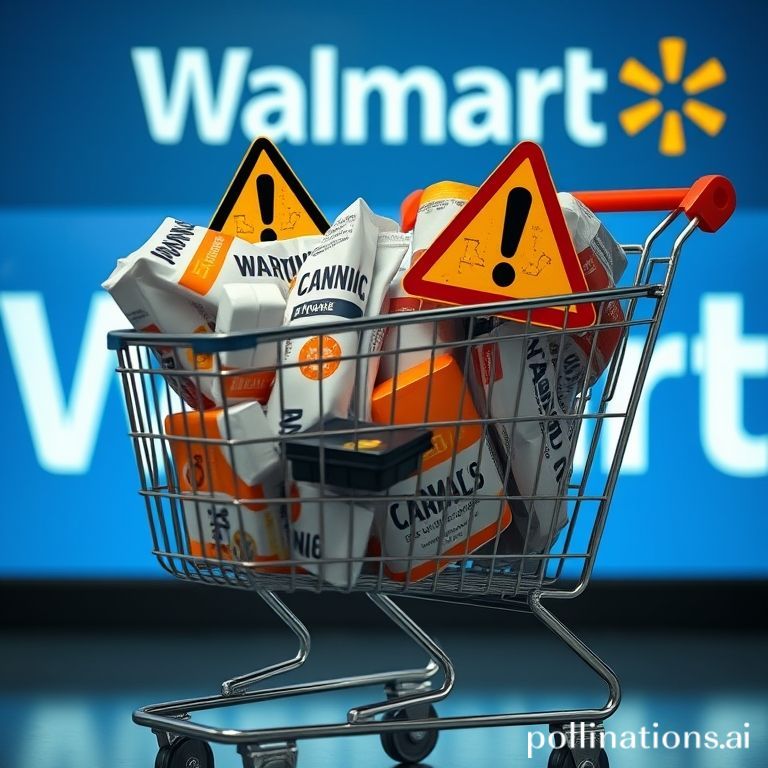Walmart's Marketplace Grapples with Counterfeits and Scams

Walmart's Marketplace: A Battle Against Fraud and Fakes
Walmart's third-party online marketplace, a platform designed to expand product offerings and compete with e-commerce giants, has reportedly encountered significant challenges, becoming a breeding ground for scammers and sellers of counterfeit goods. This development raises serious concerns about consumer trust and the integrity of online retail environments.
Unveiling the Issues: A CNBC Investigation
A comprehensive investigation conducted by CNBC, with its findings published on Friday, September 19, brought these critical issues to light. The report highlighted instances where customers purchasing items from the Walmart website occasionally received products that were not only counterfeit but also potentially unsafe. This revelation underscores a worrying trend in the rapidly expanding world of online marketplaces.
The investigation's findings were substantial, identifying at least 43 vendors who had illicitly used the identities of legitimate businesses to establish their accounts on Walmart's marketplace. Such identity theft allows fraudulent sellers to bypass initial screening processes and appear credible, deceiving both the platform and its customers. Furthermore, the report included interviews with nine sellers and four current and former Walmart employees. These individuals provided critical insights, suggesting that Walmart had relaxed its seller and product vetting procedures. This alleged relaxation of standards is believed to be a strategic move aimed at accelerating growth and intensifying competition with rivals like Amazon, inadvertently creating vulnerabilities within the system.
Voices from the Front Lines: Impact and Pressure
The consequences of these lax vetting processes are far-reaching, affecting both consumers and legitimate businesses. Elaine Damo, owner of Lifeworks-ACS, a company providing services for individuals with developmental disabilities, expressed profound disturbance over the situation. "It’s very disturbing," Damo remarked, emphasizing the systemic nature of the problem. "It’s a domino effect, and it trickles and affects everyone." Damo personally experienced this ripple effect when she received returns from more than a dozen customers who had unknowingly purchased counterfeit items from a third-party seller impersonating her business. This incident vividly illustrates the damage that fraudulent activities can inflict on a brand's reputation and customer relations, even for businesses not directly involved in the fraud.
Further testimony came from Tammie Jones, who served on Walmart’s seller vetting team from September 2023 to April 2024. Jones revealed that she felt considerable pressure to approve merchant applications, even when she harbored significant doubts regarding the applicant’s credentials or the authenticity of their documentation. She recounted a directive from her managers: "It got to a point where they were just like, ‘You know what? Just go ahead and approve everybody.’" This statement suggests a corporate culture prioritizing rapid expansion over stringent quality control, driven by the desire to secure more business and market share.
Walmart's Acknowledgment and Ongoing Battle
In response to these revelations, Walmart acknowledged the gravity of the situation. In a statement provided to PYMNTS, the company asserted, "Counterfeiters threaten brands and marketplaces worldwide, undermining trust and integrity." They affirmed their commitment to actively combatting this challenge: "At Walmart, we continuously strengthen our marketplace to protect customers and sellers. Even with over half a billion products on our platform, we take swift, decisive action to remove any counterfeit goods and bad actors who fail to meet our standards." This indicates an ongoing effort, though the CNBC investigation suggests that these efforts might not have been sufficient or consistently applied in the past.
The company had previously addressed the issue in a July blog post, acknowledging that "fraudulent sellers — who grow savvier, faking credentials and dodging enforcement — erode trust, not just in the companies who run these marketplaces, but in the thousands of large and small sellers who act with integrity and seek only to bring value and assortment to those who shop with us." This earlier statement confirms Walmart's awareness of the sophisticated tactics employed by fraudsters and the broad impact on the entire e-commerce ecosystem.
The Broader Landscape of E-commerce Fraud
The challenges faced by Walmart are not isolated incidents but reflect a wider phenomenon within the e-commerce industry. PYMNTS highlighted earlier this year the pervasive "impact of eCommerce fraud," describing it as a "mosaic of threats, each tailored to the operational rhythms of different verticals." This broader analysis provides context for understanding the complexities of online security.
For instance, retailers in the fashion sector frequently contend with issues such as "friendly fraud" and false chargebacks. This occurs when customers falsely claim a product was not delivered or was returned, despite having received and kept the item. The fashion industry's high transaction volumes, combined with often lenient return policies and frequent promotional activities, create an environment ripe for such abuses. The ease with which consumers can initiate chargebacks, sometimes without genuine cause, puts a significant burden on retailers.
Similarly, consumer electronics sellers face a distinct challenge: "SKU inflation." In this scenario, fraudsters manipulate product listings by artificially inflating reviews and search visibility for counterfeit or inferior quality goods. This tactic misleads consumers into purchasing products that do not meet their expectations, eroding trust in the platform and legitimate sellers. The continuous evolution of fraudulent methods necessitates constant vigilance and adaptation from online marketplaces.
Conclusion: The Imperative of Trust in Digital Commerce
The incidents at Walmart’s marketplace underscore a critical ongoing battle for integrity and trust in the digital retail space. While the pursuit of market share and rapid expansion is a compelling business objective, it must be balanced with robust security measures and stringent vetting processes. The experiences of affected businesses and consumers serve as a stark reminder that compromised platforms not only lead to financial losses but also significantly damage reputations and consumer confidence. As e-commerce continues to grow, the responsibility of marketplaces to safeguard their customers and legitimate sellers from sophisticated fraudulent activities remains paramount, demanding continuous investment in advanced fraud detection, stricter enforcement, and transparent communication.
